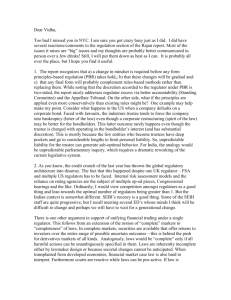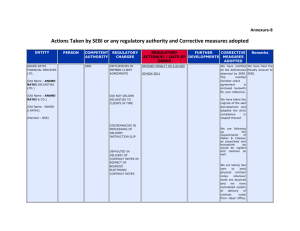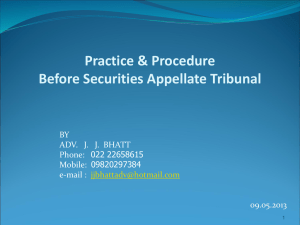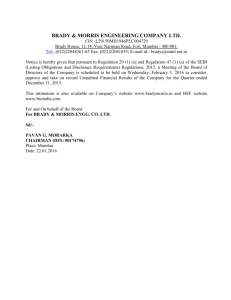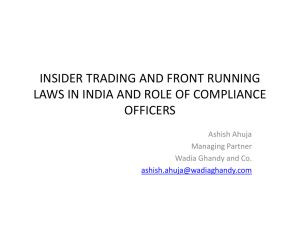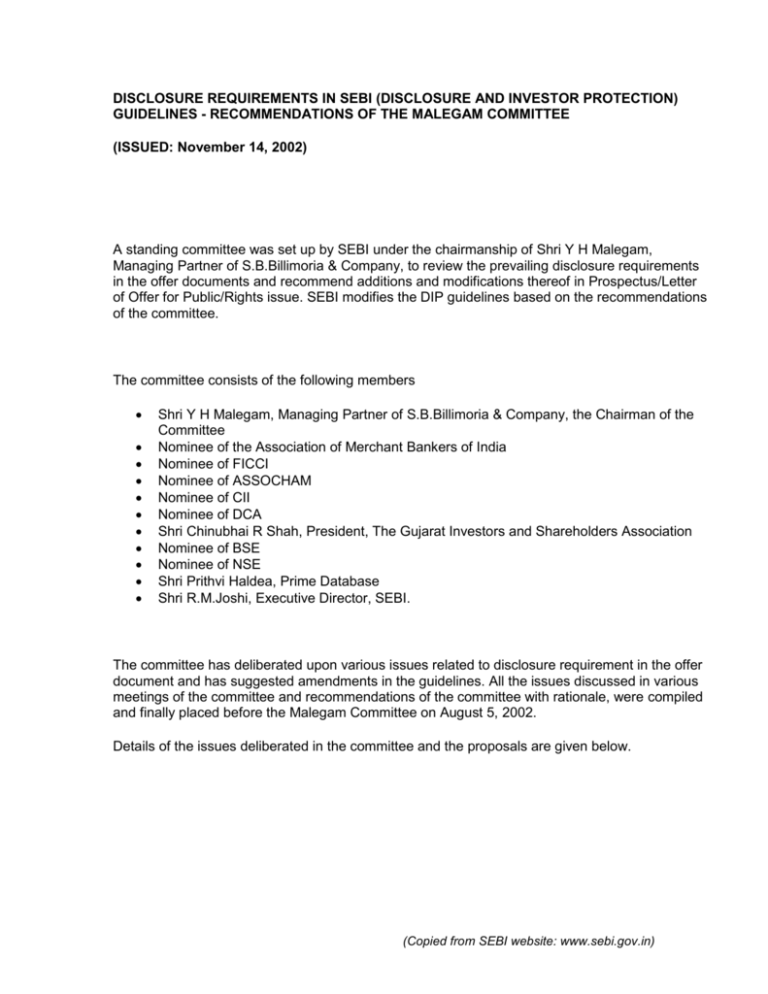
DISCLOSURE REQUIREMENTS IN SEBI (DISCLOSURE AND INVESTOR PROTECTION)
GUIDELINES - RECOMMENDATIONS OF THE MALEGAM COMMITTEE
(ISSUED: November 14, 2002)
A standing committee was set up by SEBI under the chairmanship of Shri Y H Malegam,
Managing Partner of S.B.Billimoria & Company, to review the prevailing disclosure requirements
in the offer documents and recommend additions and modifications thereof in Prospectus/Letter
of Offer for Public/Rights issue. SEBI modifies the DIP guidelines based on the recommendations
of the committee.
The committee consists of the following members
Shri Y H Malegam, Managing Partner of S.B.Billimoria & Company, the Chairman of the
Committee
Nominee of the Association of Merchant Bankers of India
Nominee of FICCI
Nominee of ASSOCHAM
Nominee of CII
Nominee of DCA
Shri Chinubhai R Shah, President, The Gujarat Investors and Shareholders Association
Nominee of BSE
Nominee of NSE
Shri Prithvi Haldea, Prime Database
Shri R.M.Joshi, Executive Director, SEBI.
The committee has deliberated upon various issues related to disclosure requirement in the offer
document and has suggested amendments in the guidelines. All the issues discussed in various
meetings of the committee and recommendations of the committee with rationale, were compiled
and finally placed before the Malegam Committee on August 5, 2002.
Details of the issues deliberated in the committee and the proposals are given below.
(Copied from SEBI website: www.sebi.gov.in)
DETAILS OF THE ISSUES DELIBERATED IN THE COMMITTEE
1.
Materiality of Risk Factors
As per requirement of extant SEBI (DIP) Guidelines, 2000, risk factors and management
perception of those risk factors, if any are required to appear on the first inner page and shall
continue to other subsequent pages, if required, of the offer document.
The committee felt the need of laying down materiality criteria for disclosing risk factors in the
offer document as many unnecessary risk factors increase the number and divert the attention of
the reader from important risk factors.
The committee recommended the followings:
Risk factor should be determined on the basis of their materiality. Materiality should be
decided taking the following factors into account
o
Some events may not be material individually but may be found material collectively.
o
Some events may have material impact qualitatively instead of quantitatively.
o
Some events may not be material at present but may be having material impacts in
future.
Risk factors should appear in the Offer Document in the following fashion:
o
o
Risks envisaged by Management
How the risks are proposed to be addressed.
2. Undertaking by the directors in the draft ‘Offer Document
Section 56 of the Companies Act, 1956 read with Clause No. 6.3.4 and Clause No. 6.52 of
SEBI(DIP) Guidelines, and 2000, indicate that the directors of the company accept responsibilities
for the statement/disclosures made in the final offer document signed by them.
It was noted that a draft offer document (prospectus/Letter of Offer) once filed with SEBI,
becomes a public document. The committee therefore felt the need to make the directors
accountable for the facts given in draft offer document also.
The committee recommended that the draft offer document submitted to SEBI needs to be
approved and signed by the Board of Directors of the company.
3. Strengthening disclosures about the promoters/directors
SEBI (DIP) Guidelines, 2000, requires disclosures regarding name, address and shareholding of
the promoters/directors in the offer document.
In order to make tracking down of the promoters/directors more effective, the committee
recommended that photographs of the promoters and proofs of their identities like PAN No.,
passport no, bank account no., driving license no. should be disclosed in the offer document.
(Copied from SEBI website: www.sebi.gov.in)
4. Means of Finance
As per existing requirement of SEBI (DIP) Guidelines, 2000, 'Means of Finance' of the project of a
particular issue is to be disclosed in the offer document.
The committee was of the view that a company should tie up all other sources of fund prior to
raising money from public because achieving financial closure makes a project more certain and
thus takes care of the investors taking part in the Public/Rights Issue.
The committee recommended the followings:
The companies should not be allowed to come out with a public/rights issue unless
75% of the stated means of finance are tied up.
A disclosure is to be made in the offer document in this regard
The balance non-tied up portion of the means of finance should be mentioned as such
without specification.
5. Long-term capital expense and working capital expense
As per extant SEBI (DIP) Guidelines, 2000, no differentiation between long-tern fund requirement
and working capital requirement is required to be done under the heading 'Objects of Issue' in the
offer document.
The committee felt the need to differentiate between Capital expenses and Working Capital
expenses to ensure better disclosure and clarity about proposed deployment of funds
The committee recommended that a differentiation should be made in funds being raised for
a final purpose like fixed assets etc. and funds proposed to be utilized for rotation such as
working capital etc. The requirement of funds, in the former case, should particularly be
stated very clearly and specifically.
6. Provisions relating to Qualified Institutional Buyers (QIBs) in Book-Building issues
The existing SEBI (DIP) Guidelines do not prescribe any financial commitment from the Qualified
Institutional Buyers (QIBs) participating in Book-Building Issues. QIBs play a major role in
discovering price in mandatory Book-Building Issues (Clause 11.3.5 read with Clause 2.2.2 and
Clause 2.3.2 of SEBI (DIP) Guidelines, 2000).
In order to facilitate genuine price discovery., the committee recommended the following
There should be provisions for some financial commitment from the QIBs
Withdrawal of bids made by the QIBs should not be allowed
The identity of QIBs bidding in the issues should not be made public as this may
influence the bidding sentiment of retail investors
(Copied from SEBI website: www.sebi.gov.in)
7. Reference date for reckoning 'Net Worth'
As Clause 2.2.2 and 2.3.2 of SEBI (DIP) Guidelines, 2000, a company is required to make an
issue through Book Building route if the issue size of the company exceeds five times the pre
issue net worth or in case, the company does not have a track record of distributable profits and
net worth for at least three out of the immediately preceding five years.
It was pointed out that the aforesaid requirement can be circumvented by an issuer by issuing
equity in two stages. The same is explained under.
Suppose a company, having a net worth of Rs. 1 crore at the beginning of the year, plans to raise
Rs 6 crores from the market by means of public issue in one financial year. If it raises the whole
amount in one go, it has to follow book building route as the proposed issue size is more than 5
times of the pre-issue net worth. In stead of raising Rs 6 crore, the company may raise the
money in 2 tranches say Rs. 2 crores and Rs. 4 crores and can avoid adopting book building
route. The reason is that at the time of first tranche, issue size of Rs.2 crores is not more than 5
times of the pre-issue net worth of Rs. 1 crore and in the case of second tranche issue size of Rs.
4 crores is not more than 5 times of the pre-issue net worth of Rs. 3 crores. (Rs. 1 crore at the
beginning of the year plus Rs. 2 crores raised through earlier tranche.)
The Committee recommended the followings to address the same:
1. The definition of "net worth" as provided in Clause No. 1.2.1(xix)(a) of SEBI (DIP)
Guidelines, 2000 may be modified to reckon networth as on the previous year.
2. The guidelines should provide that cumulative of the issued amount raised in a
financial year be used as a reference for calculating the post issue net worth.
8. Disallowing Issues by Companies having promoters with questionable track records
SEBI basically follows disclosure based Regulations/Guidelines which have the effect of leaving
the investment decisions to the investors without SEBI having to sit in judgment in each case. The
committee revisited the basic issue i.e. should SEBI have the power to prevent issues by persons
having undesirable track record and if so such powers be exercised.
The committee recommended that SEBI should have some residual power to disallow such
issues. In this regard, the committee recommended that the following procedure may be adopted
by SEBI:
(a) The initial decision as to whether the issue should be permitted may be taken
internally by SEBI.
(b) If SEBI comes to a conclusion that the issue should not be permitted, it should refer
the matter to an Independent Panel formed under the SEBI Act consisting of
eminent persons from different fields.
(c) SEBI may take a decision after considering the recommendations of the
Independent Panel.
(d) If SEBI decides not to allow the issue, the proposed issuer shall have a right of
appeal to an Independent Appellate Authority under the SEBI Act.
(e) The decision of the Independent Appellate Authority would be binding on SEBI.
(Copied from SEBI website: www.sebi.gov.in)
9. Transfer of locked-in shares
As per clause 4.16 of SEBI (DIP) Guidelines, 2000, interse transfer of locked-in share amongst
promoters are permissible subject to continuity of lock-in in the hands of transferee. This clause is
applicable only in the case of public issues.
As per Clause 13.3 of SEBI (DIP) Guidelines, shares issued to promoters through preferential
allotment are subject to lock-in for a period of three years. However, the guideline is silent about
transferability of these shares.
In this regard, the committee recommended that locked-in shares issued under preferential
allotment should also be allowed to be transferred amongst promoters subject to continuation of
lock-in.
It is felt that the locked-in shares (irrespective of the mode of issue i.e whether public issue or
preferential allotment) should be permitted to be transferred either amongst promoters or to an
outsider, if he is the new promoter/ person in control of the company subject to his complying
with the provisions of SEBI( Substantial Acquisition of Shares and Takeovers) Regulations, 1997
and with the requirement of continuation of lock-in for the remaining period.
Accordingly, the committee proposed that the following:
Any locked-in share held by the promoters can be transferred to co-promoter or any new
promoters subject to
Continuation of lock-in for the remaining period in the hands of transferees
Due compliance with the provisions of SEBI( Substantial Acquisition of Shares and
Takeovers) Regulations, 1997.
10. Units of Financial values used in the 'Offer Document
At present, different units of financial values are used in the offer document and SEBI (DIP)
Guidelines, 2000 are silent on this issue.
It was opined by the members that same unit of financial values would bring consistency in the
manner in which the financial statements are disclosed in the offer document.
Accordingly, the committee recommended that one standard financial unit may be used in the
offer document.
11. Issuance of shares through preferential allotment for consideration other than cash
SEBI has received representations that in cases where shares are allotted to promoters, the
valuation does not appear to be fair and authentic. There is a need to obtain an independent
valuation.
(Copied from SEBI website: www.sebi.gov.in)
After a lot of deliberations on this subject the committee recommended that
Whenever shares are issued on preferential basis to promoters, their relatives,
associates and related entities for consideration other than cash, valuation of the
assets in consideration for which the shares are issued should be done by an
independent qualified valuer.
In case the Stock Exchanges have any doubt about the authenticity of valuation got
done by the company, they may get the valuation done by any other valuer and can
obtain the necessary information by using the provisions of the general clause in
the listing agreement.
12. Disclosure of Financial statements based on different accounting standards
It was noted that some issuer companies, to cater to cross section of investors, are incorporating
financial statements based on more than accounting standard viz. Accounting Standards
specified by ICAI and US GAAP, in the offer document.
In this regard, the committee recommended that
The Issuer Company, if desires so, can include the financial statements prepared on
the basis of more than one accounting standard, in the offer document subject to
disclosing the material differences arising because of differences in the accounting
policies between the two different accounting standards.
Management Discussion and Analysis should be based on the Financial Statements
prepared on the basis of Indian Accounting Standards.
13. Due diligence of Merchant Bankers
As per clause 5.4.1.1 of SEBI(DIP) Guidelines, 2000, a merchant banker who is associated with
the Issuer Company as a promoter or director is prohibited from lead managing the issue. This is
aimed at maintaining an arm's length relationship between the Issuer Company and Lead Manager
associated with the issue.
The committee felt that there is a need to define “Associates”. In this regard, the committee
recommended that a Body Corporate or a merchant banker shall be deemed to be an
associate of the other where:
It controls directly or indirectly not less than 10 percent of the voting power of the body
corporate or of the Merchant Banker, as the case may be; or
There is a common director among the body corporate and the Merchant Banker
The Committee also recommended that if more than one merchant banker is associated with
the issue, then responsibility of each Merchant Banker is to be clearly demarcated in the
inter-se allocation of responsibility, to be submitted to Board and to be disclosed in the
offer document. The lead managers who are responsible for conducting due diligence
exercise with respect to contents of the offer document, as per inter-se allocation of
responsibilities have to sign due diligence certificates.
(Copied from SEBI website: www.sebi.gov.in)
14. Branding of securities
At present, in case of some issues, instruments are being branded as 'safety bonds'. Some
members pointed out that this may misguide the investors about the quality of the instruments to
be issued.
Therefore, the committee recommended that issues can be branded describing the nature of
the instrument but not the quality of the instrument
15. Rationalization of Observation Procedure
As per the existing practice, draft offer document submitted to SEBI is to be refiled if any material
change takes place after the filing of offer document to SEBI.
In this regard, the committee recommended the followings to make the observation procedure
and in turn the issue procedure more effective:
In case of any material changes prior to observation given by SEBI, there is no need
to re-file the document. Intimation to SEBI about material change is enough.
In case of material change after getting the observations from SEBI, the company
has to submit revised draft offer document to SEBI. There is no need to re-file the
document. Lead Manager can submit revised draft offer document till 21 days prior
to the end of validity period of observation. If the revised draft is submitted later
than 21 days prior to the end of the validity period, the validity period is extended to
another 21 days to SEBI for consideration of the revisions. Validity of observation
period will be counted from the date of initial observation.
Validity of SEBI’s observation letter should be reduced to 6 months from existing
one year period.
16. Commencement of lock-in period
As per Clause 4.11.2 of SEBI (DIP) Guidelines, the last date of lock-in of minimum promoters’
contribution in case of a Public Issue shall be reckoned as three years from the date of allotment
in the public issue or from the date of commercial production, whichever is later.
The committee, to ensure effective implementation of the aforesaid clause, recommended that
lock-in period shall commence from the date of allotment in public issue.
17. Additional disclosure requirement in case of Dot Com companies
The report of Accounting Standard Sub-Committee on 'Additional Disclosure in respect of DotCom/Biotech Companies' was placed before the committee for discussion The committee
accepted the report of Accounting Standards Sub-Committee on Dot Com Companies,
which was made public earlier, recommending the relevant disclosures in the offer
document.
(Copied from SEBI website: www.sebi.gov.in)
18. Definition of Profit for eligibility
As per existing SEBI (DIP) Guidelines, 2000, an unlisted company can come out with a fixed price
issue if it has a track record of making profit in 3 years of immediately preceding last 5 years. The
committee, to make the said requirement more effective, recommended that extraordinary items
should not be included for calculating the profit for the said purpose.
All text and media on these pages are © Copyright, Securities and Exchange Board of
India. All rights reserved.
(Copied from SEBI website: www.sebi.gov.in)


